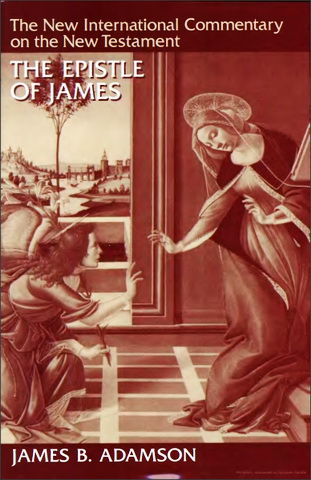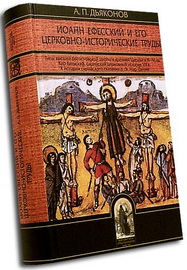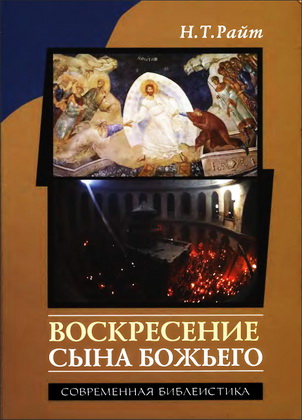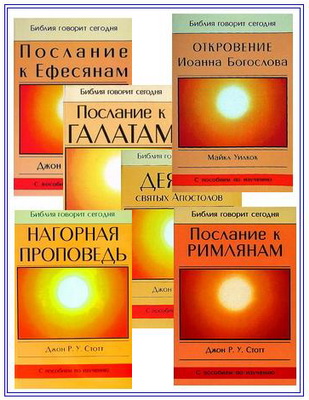
Adamson - The Epistle of James
The New International Commentary on the New Testament
One of the chief aims of this book is to combat what I consider a fatal error made already by Luther and now in far too many modern commentaries on James: his Epistle is generally regarded as completely lacking any cohesion of thought or design. Thus C. Leslie Mitton: "There is in fact no discernible plan in the epistle"; B. S. Easton: "While the entire work undoubtedly possesses a certain unity, it lacks any formal plan—not only as a whole, but in its separate parts"; and William Barclay: "It is difficult, if not impossible, to extract from James, a continuous and coherent plan or scheme." This point will receive attention in due course.
James B. Adamson - The Epistle of James
(The New International Commentary on the New Testament)
William B. Eerdmans Publishing Co.
255 Jefferson Ave. S.E., Grand Rapids, Mich. 49502
1976, reprinted 1984 - 227 pp.
ISBN 0-8028-2377-7
James B. Adamson - The Epistle of James - Contents
Editor's Preface
Author's Preface
Abbreviations
The Epistle of James, A Short Summary
INTRODUCTION
I. Author
II. Purpose
III. Synoptic Relation
IV. Teaching
V. History
VI. Select Bibliography
VII. Analysis of the Epistle of James
TEXT, EXPOSITION, AND NOTES
CHAPTER 1
Excursus A. James 1:2: "All Joy"
Excursus B. James 1:3: A Suggested Emendation
Excursus C. James 1:7: An Explanation
Excursus D. James 1:17: Discussion of the Text
Excursus E. James 1:21: "The Implanted Word"
CHAPTER 2
Excursus F. James 2:18: A Further Explanation
CHAPTER 3
Excursus G. James 3:5, 6: A Further Explanation
CHAPTER 4
CHAPTER 5
Excursus H. Anointing with Oil in Later Tradition
Excursus I. "The Prayer of a Righteous Man"
INDEXES
I. Subjects 211
II. Authors 214
III. Scriptures
James B. Adamson - The Epistle of James - Purpose
Among our NT Epistles that of James is unique, a distinction which too often has led to its disparagement. The quality and diversity of the contents of his Epistle have nevertheless been recognized by some commentators. D. A. Hayes, for example, rightly aligns him in substance and authority with Elijah and Moses, and in style and diction with some of the best qualities of the Psalms and the Prophets: his earnestness is seen in his use of over 50 imperatives in the 108 verses of the Epistle, which from beginning to end burns with the passion of a sincerely Jewish Christianity. James may well be called "the Amos of the new covenant."
In our opinion, the Epise o James is a quasi-prophetic letter of pastoral encouragement,.and, no less, of pastoral rebuke, proceeding from an unquestioned right of pastoral vocation and authority. It.was most natural that James, as first "Bishop'' (or whatever we may style him).of Jerusalem, should address his charges, not only in Palestine but also in their many and great centers elsewhere;, and if he was, as we. believe, the author of the missive in Acts 15:23ff., it shows his skill in letter-writing. We have too long been hampered by two misconceptions, first that James lacks unity and coherence, and second that James's concept of Christianity is peculiar and unorthodox. First, the sustained unity of its structure is, we believe, indisputable, and so is the sustained unity of its style: and, besides the author's distinctively powerful choice and use of language, no less impressive is the unity of personal character and Christian thought conspicuous throughout the Epistle. Second, it does seem truly characteristic of James to put the sum of his message into his exordium and then repeat it, elaborating and confirming it every time it recurs. In Jas. 1:3,4 we have the first statement of the whole theme of his religion, and of his Epistle—"faith," "endurance," "work," leading to perfection, to approbation, and to the final reward.
We should not be surprised that the Epistle of James does not even seek to outline all the essential doctrine comprised in the Christian faith. Like Paul in his Epistles, James is addressing people who are supposed to know the rudiments of Christianity; and his aim, as in the Sermon on the Mount, is to set forth the theonomic life in its essentials, that is, life lived according to God's Law. James's task, like Paul's in his Epistles, is mainly practical, to help the sincere to live up to their faith, and very often to correct errors, misunderstandings, and backslidings resulting in conduct unworthy of the Christian faith. There is indeed more theology in Paul and others than in James or in the gospel preached by Jesus, but essentially they all hold the same religion, the same as James preached in short but full simplicity. James should not, and cannot, be understood in isolation, but is to be read in the whole context of the NT.





Комментарии (2 комментария)
Спасибо за труд!
Дж. Адамсон - хороший автор, принадлежащий, как принято говорить, к "консерваторам". В сети есть его другая книга: Adamson J. James: The Man and His Massage. Grand Rapids: Eerdmans, 1989.
Кажется, на Э. собирается коллекция комментариев на Послание Иакова, и это меня радует!
Отдельная благодарность мастерам, делающим красивые книги с грубых пдф-исходников даже без обложки! К сожалению, ученые, проживающие на пмж в библиотеках, пока не научились делать качественные сканы...